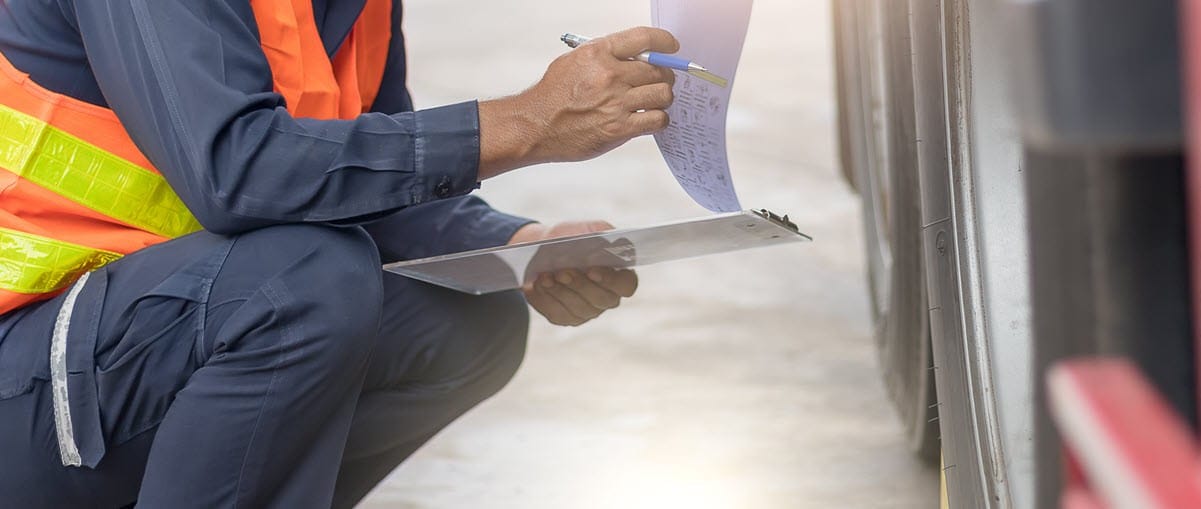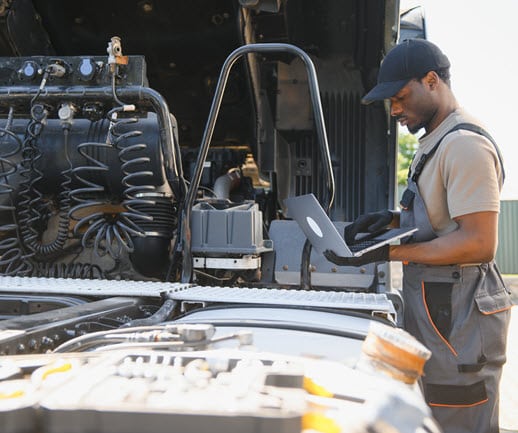
Kansas City Inadequate Truck Maintenance and Inspection Lawyers
30 years of experience fighting for Missouri and Kansas truck accident victims
One of the best ways to avoid truck accidents is to make sure that the trucks used for a shipment have been inspected, repaired, and maintained. At Kansas City Accident Injury Attorneys, when truck accidents happen, we review who had the duty to ensure trucks are safe, what part of the truck wasn’t properly inspected or maintained, and how the inadequately maintained truck caused your accident. Our Kansas City inadequate truck maintenance and inspection lawyers file personal injury and wrongful death claims against all responsible parties. Call us today to assert your right to compensation.

How can we help?
- What laws regulate truck maintenance and inspections in Missouri and Kansas?
- What trucking standards govern truck maintenance and inspections in Missouri and Kansas
- Who is responsible for truck accidents caused by improper maintenance or inspections?
- Do you have an inadequate truck maintenance and inspection Kansas City lawyer near me?
What laws regulate truck maintenance and inspections in Missouri and Kansas?
The Federal Motor Carrier Safety Administration (FMCSA) requires that motor carriers regularly inspect, repair, and maintain all commercial motor vehicles (CMVs) under their control. Employees of the carriers who are “directly involved with the inspection and upkeep of vehicles must comply with the rules and regulations of 49 CFR 396.” The parts and accessories are required to be in safe and proper operating condition.
“The term commercial motor vehicle includes each vehicle in a combination vehicle. For example, for a tractor semitrailer, full trailer combination; the tractor, semitrailer, and the full trailer (including the converter dolly if so equipped) must each be inspected.”
Inspections of commercial trucks must be conducted at least once a year. There must be an inspection report for each inspection.
The truck parts that must be inspected include those listed in Appendix A:
- The brake system. This system includes the service brakes, brake linings, pads, air compressor, electric brakes, and hydraulic brakes. Commercial trucks have complicated brake systems. Even when brakes are working, trucks need more time and distance to stop. If the brakes fail, the accidents that result are likely to cause deaths and catastrophic injuries.
- Tire blowouts can cause a Missouri or Kansas truck driver to lose control of their truck, which can be deadly.
Other truck parts that the FMCSA requires to be inspected include:
- Coupling devices
- Exhaust systems
- Fuel systems
- Lighting devices
- Safe loading parts
- Steering mechanisms
- Suspensions
- Frames
- Wheels and rims
- Windshield glazing and windshield wipers
- Rear impact guards
Missouri also has its own inspection, repair, and maintenance requirements. Missouri truck companies must keep the following information for every vehicle that they have controlled for 30 days or more:
- Identifying information: company number, make, serial number, year, and tire size
- A schedule of inspections to be performed, including type and due date
- Inspection, repair, and maintenance records
What trucking standards govern truck maintenance and inspections in Missouri and Kansas
Truckers Training recommends the following inspections for each trip:
- Paperwork. Check all necessary paperwork, starting with your commercial driver’s license.
- Examine the cab. The seatbelts should be working. The dials and controls should work along with the windshield, heating, and defroster.
- Emergency kit. Trucks should have an emergency kit in case the truck breaks down. The kit should include fire extinguishers or fire blankets, spare light fuses, and red triangles.
- The engine. Checking the engine should be at the top of every truck driver’s and truck owner’s list. The examination should check for any oil leaks from unusual places and loose hoses. The driver should start the engine and listen for unusual sounds – especially if the truck hasn’t been driven for a while.
- Fuel check. The truck should have enough fuel to complete the trip. The fuel gauges should work. The fuel lines should be clean.
- Battery check. The battery terminals should be examined for corrosion or other damage. “Many trucks allow the connection of a battery voltage tester via the in-cab cigarette lighter. This can confirm whether the battery is charging correctly. The check should also test that the battery is seated correctly and does not move during transit.”
- The coupling system. The coupling system between the truck and the trailer should be examined to check that the “electrical and air lines are properly connected. There should be no obstructions or any sign of wear and tear on the lines that could indicate a potential failure.” The electrical line shouldn’t have exposed wires. The air lines shouldn’t have leaks, cracks, or rot.
- The trailer. Truckers Training recommends checking that all the connections are secure, that there are no missing rivets or holes in the headboard, that the landing gear is sturdy, and that there are no “signs of cracks, broken or bent areas, as these could cause catastrophic failure.”
- “The suspension and the brake system should be checked on the trailer as well as on the cab.”
- The tires. The tread depth of the tires (and the spares) on the cab and the trailer should be checked. The mud flap should be secured. The wheel nuts should be tight, and they should all be there.
- The lights.
The lights on the front of the cab should be checked – headlights, sidelights, and indicators. Then the lights on the trailer should also be checked – rear lights, indicators, and brake lights. Do not presume that if the lights work on the cab that they work on the trailer. When checking the lights, do not forget to check the reflectors. These become particularly important for driving in the dark but are vital at any time.
- Air brakes. These should be examined “by means of a leak down test, to ensure that there is no loss of pressure nor leaks in the system. This will also test the warning system that warns the driver of problems.”
Commercial trucks should also have electronic driving logs, which the FMCSA requires.
Who is responsible for truck accidents caused by improper maintenance or inspections?
At Kansas City Accident Injury Attorneys, we hold truck drivers and trucking companies accountable when their failure to competently inspect their vehicles leads to an accident. We file claims against:
- Truck drivers. Truck drivers should inspect the trucks they drive before each trip. They should be alert to any signs that their truck needs to be examined by a truck mechanic. Additionally, they must notify their employer if there are any safety issues.
- Trucking companies. These companies include the truck driver’s employer and the owner of the trucks. We hold these companies accountable when they fail to regularly inspect their trucks, keep their inspection and maintenance records current, make prompt repairs, and take unsafe trucks off the road.
- Other companies. Our Kansas City truck maintenance and inspection lawyers also file claims against third parties, such as repair companies that make fault repairs and manufacturers that use defective truck parts.
Do you have an inadequate truck maintenance and inspection Kansas City lawyer near me?
Kansas City Accident Injury Attorneys’ office in Kansas City is located at 510 Walnut Street, Suite 100. We also have offices in Lee’s Summit, St. Joseph, Blue Springs, and Parkville, MO - and in Victory Hills, Overland Park, and Olathe, KS by appointment. When necessary, we do see clients away from the office. Our attorneys also speak with clients by phone and through video conferences.
We understand how worried you are. We are ready to fight for all the compensation you deserve.
Contact our respected Kansas City inadequate truck maintenance and inspection lawyers now
Trucking companies must take precautions to ensure their trucks are safe. Regular inspections and maintenance are essential. Our Kansas City truck accident lawyers hold trucking companies, owners, maintenance, and repair companies accountable when preventable accidents happen in Missouri or Kansas. To schedule a free consultation, please call Kansas City Accident Injury Attorneys or fill out our contact form. We handle truck accident cases on a contingency fee basis.

